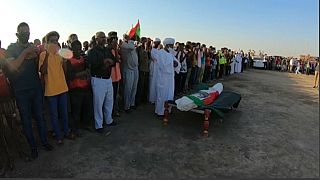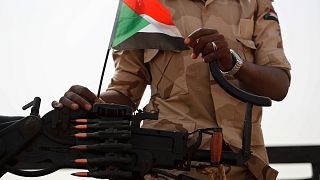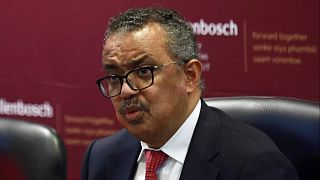Sudan
Still Standing Strong Two Years Later
Sudan was rocked by nationwide demonstrations Saturday with thousands marching in the capital city alone - calling for a faster pace to democratic reforms on the two-year anniversary of the December 19, 2018, uprising that saw the eventual ousting of ex-president Omar al-Bashir in 2019.
Mosaab al-Shraif, a Sudanese citizen, is impassioned about the movement.
"We went out today, December 19, and I say to those who say that today is a remembrance and a celebration that it is not a celebration, but a continuation of the glorious December revolution. This is not a new revolution, but the same revolution of December 2018. We are now in December 2020 and we've come out to fulfil the demands of our revolution that have not been fulfilled and bring down all of them (the regime)."
Footage circulating online Saturday showed thousands of protesters marching in Khartoum and its twin city, Omdurman, as well as in other cities across the country.
Security forces closed off major roads and streets leading to government and military headquarters in Khartoum ahead of the protests.
Demands Have Not Been Met
The protests were incited by the Sudanese Professionals' Association, and the Resistance Committees, which were both instrumental in the 2018 revolt that demanded the army generals who replaced Bashir to share power with civilian officials.
Mubarak Sir al-Khatem, a Sudanese protester, outlines the demands of the activists.
"We demand the formation of the Legislative Council first and the removal of the Military Council from the ruling. We want 100% civilian rule, and we do not want the army to participate in the governance with us. The soldiers have certain boundaries, they must respect their boundaries."
Tensions have largely centred on the Sudanese military's economic assets, over which the civilian-run finance ministry does not have control.
As tensions rise between military and civilian members of Sudan's transitional government, which was set up after al-Bashir's arrest, the activists are calling for the army to make good on the promised reforms.
Background
Sudan's youth-led movement started on December 19, 2018, seeking greater freedoms and an end to Sudan's international isolation.
Bashir was finally ousted by the army in April the following year, and the new authorities have since put him on trial over the Islamist-backed coup that first brought him to power in 1989.
He also faces genocide charges from the International Criminal Court (ICC).
But those responsible for the repression during the revolution have not been brought to justice.
Experts warn the country is now at a critical juncture, as tensions have flared between the military and civilian leaders who share power in a fragile transitional government.
Earlier this month, the United States removed Sudan from its list of state sponsors of terrorism, a designation dating from the times when Bashir hosted Osama bin Laden and other Islamist militants.











01:00
'Good Trouble’ rallies across US push back on Trump agenda
Go to video
"Enough Is Enough": Liberians protest for justice, jobs, and accountability
Go to video
Togo protest crackdown raises fears of worsening political crisis
02:21
Ivorian diaspora in Paris demands free and inclusive elections ahead of October vote
02:16
Kenya's William Ruto faces growing discontent over economy and police brutality
01:02
Togo: Amnesty International calls for end to use of force against protesters